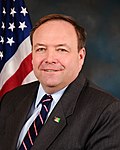Near East South Asia Center for Strategic Studies
From Wikipedia, the free encyclopedia
The Near East South Asia (NESA) Center for Strategic Studies is a U.S. Department of Defense institution for building relationships and understanding in the NESA region. The NESA Center supports the theater security cooperation effort of four Regional Combatant Commands: United States Central Command (USCENTCOM), United States Africa Command (USAFRICOM), United States European Command (USEUCOM), and United States Pacific Command (USPACOM) and is one of five regional centers that fall under the Defense Security Cooperation Agency.[1] NESA was established in 2000. The NESA Center seeks to build on the strong multilateral relationships between the U.S government and its allies in the region, including regional governments and their armed forces, by focusing on broader multilateral approaches and capacity building to address regional security issues and concerns. The NESA Center is located at Fort Lesley J. McNair in Washington, DC.
This article contains promotional content. (April 2015) |
| Agency overview | |
|---|---|
| Formed | 2000 |
| Jurisdiction | United States Government |
| Headquarters | National Defense University Washington, D.C. |
| Employees | 60 (2012) |
| Agency executive |
|
| Parent agency | Department of Defense, Defense Security Cooperation Agency, |
| Website | NESA Center |
Mission statement
Summarize
Perspective
NESA Mission
- To enhance security in the Near East and South Asia by building sustained, mutually beneficial relationships; fostering regional cooperation on security issues; and promoting effective communications and strategic capacity through free and candid interaction in an academic environment.[2]
The NESA Center fosters open communication and educational opportunities for military and civilian representatives from the NESA region and other participating countries. Its academic environment uniquely facilitates a cross-cultural examination of the events, ideas, and challenges that shape this critical region.
The NESA Center has implemented programs on countering ideological support for terrorism, increasing and improving strategic communication and outreach to the region, and supporting other strategic goals.
Achieving the NESA Mission
The following activities lead to achieving the core mission of developing a well-informed community of leaders and decision-makers:
- Sponsoring foundational seminars, primarily in Washington, D.C.
- Reaching a larger audience of strategic thinkers and adding depth via a robust program of local and in-region engagement activities
- Sustaining interest and promoting growth through networked outreach and alumni activities.
Countries in the NESA Region

Senior Leadership
The Center’s senior leadership come to NESA after long and distinguished careers[3] with institutions such as the Department of State and the United States Military. These individuals contribute their knowledge and experiences to the Center’s mission on a daily basis.
Faculty
The NESA Center faculty represents a diverse assemblage of top-tier academics[4] and expert practitioners from academia, diplomacy, and defense. The NESA Center's faculty comprises retired governmental, diplomatic, and military leaders from the United States and the NESA region. Professors include men and women who have served as practitioners—ambassadors, government ministers, field- and flag-grade military officers, as well as traditional university faculty. The knowledge, experience, and “whole of government” expertise of the NESA Center's faculty provide a deep pool of knowledge that gives its participants a focused and uniquely inclusive education that better enables them to engage in the myriad challenges facing the NESA region.
Outreach
Summarize
Perspective
Reaching Out to a Global Audience

Strategic communications and outreach are key regional center priorities. The NESA Center established an Outreach Office to coordinate all communication with:
- Points of contact in US embassies overseas and foreign embassies in Washington
- Participants before and during programs
- Alumni after they leave Washington seminars
- US government stakeholders, both in Washington and overseas
- The interagency strategic communications community
- Media, both domestically and in the region
The Center aims to generate a dialogue that begins with the programs and continues after participants leave. NESA produces short, non-attributed executive summaries after seminars and trips. These reports circulated on a limited basis to senior USG stakeholders, contain key/new facts or opinions gleaned from discussions with participants. The purpose of the summary is to help senior policymakers stay informed of views to which they would not otherwise be exposed. These executive summaries routinely generate responses from the 3- and 4-star general/flag officers and their civilian equivalents.
The NESA Center Director is leading the development of an active media outreach program, including travel to the Persian Gulf to meet with media in the region.
Foundation Programs
The NESA Center conducts various seminars on a nearly continuous basis year-round, examples of which are provided below:
- Executive and Senior Executive Seminars
- Executive and Senior Executive Combating Terrorism and Transnational Threats Seminars
- Washington Seminar Series
- Senior National Representatives Seminar
- Embassy Orientation Program
- Strategic Studies Network
Other Tailored Programs
- U.S.-South Asia Leadership Engagement Program (NESA-Harvard)
- U.S., Pakistan, and Afghanistan Programs
- Tunisian National Defense Institute
Other Regional Centers
NESA is one of five regional centers under the Defense Security Cooperation Agency. The other centers include:
References
Wikiwand - on
Seamless Wikipedia browsing. On steroids.

